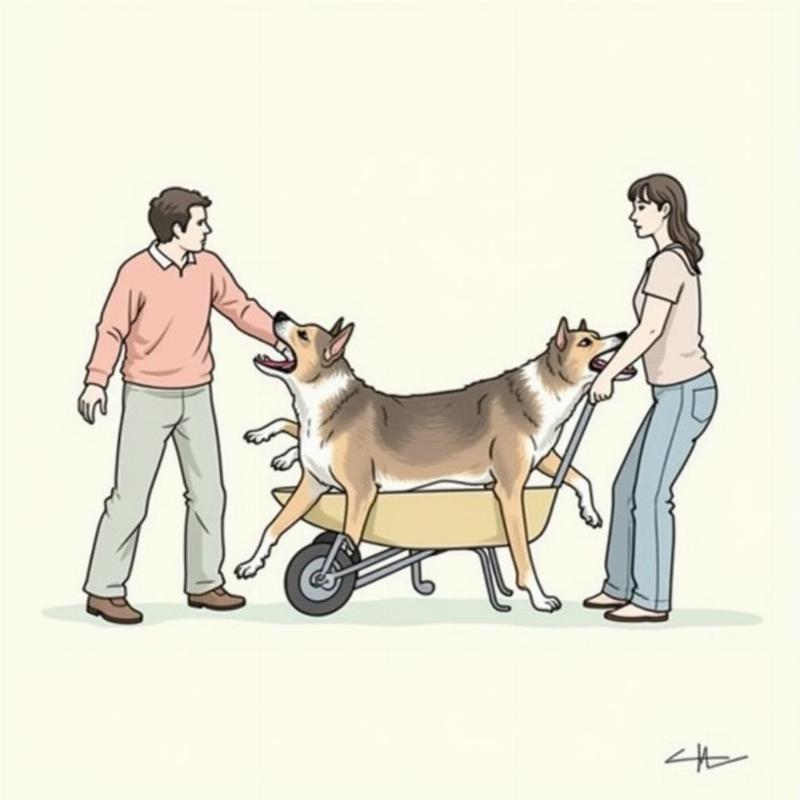Dog fights can be terrifying, but knowing how to react can prevent serious injuries and help restore harmony in your multi-dog household. Understanding why dogs fight is the first step to preventing future altercations. This article will provide practical advice, grounded in American Kennel Club guidelines and best veterinary practices, on how to safely break up a dog fight and address the underlying issues.
Understanding the Roots of Canine Conflict
Dogs, like humans, have their own unique personalities and communication styles. Misunderstandings can arise, especially in multi-dog homes. Competition for resources, such as food, toys, or even your attention, is a common trigger. Dominance disputes, territoriality, and underlying anxiety or fear can also contribute to canine aggression. Even seemingly playful interactions can escalate if one dog misinterprets the other’s signals. Identifying these triggers is crucial for effective intervention and prevention.
Safely Breaking Up a Dog Fight
Never intervene in a dog fight with your bare hands. The risk of being bitten is extremely high, even by your own dog. Instead, try these methods:
- Loud Noise Distraction: A sudden, loud noise, such as banging pots or blowing an air horn, can startle the dogs and interrupt the fight.
- Water Spray: A hose or spray bottle can be effective, but avoid spraying directly in the dogs’ faces.
- Physical Separation: If possible, use a large object like a chair or blanket to wedge between the dogs.
- Wheelbarrow Method: If two people are present, each person can grab the hind legs of one dog, lift them like a wheelbarrow, and pull them backward. This breaks their grip and allows for separation.
 How to stop dogs fighting
How to stop dogs fighting
Preventing Future Fights
Once the immediate danger is over, it’s crucial to address the underlying causes of the fight.
Managing Resources:
- Separate Feeding Areas: Designated feeding spaces reduce competition for food.
- Toy Rotation: Limit access to all toys at once. Rotate toys regularly to keep them novel and less likely to be guarded.
- Individual Attention: Ensure each dog receives individual attention and affection to minimize jealousy.
Behavioral Modification:
- Professional Guidance: A certified dog trainer or veterinary behaviorist can provide tailored advice and training techniques.
- Desensitization and Counterconditioning: These techniques can help dogs learn to associate previously triggering situations with positive experiences.
- Medication: In some cases, medication may be necessary to manage underlying anxiety or aggression. natural remedies for valley fever in dogs
Environmental Management:
- Safe Spaces: Create separate areas where each dog can retreat and feel safe. dog park elk grove ca
- Structured Walks: Walking dogs separately can minimize tension and reactivity on walks. central park county dog park
Conclusion
Knowing what to do when your dogs fight is crucial for their safety and well-being. By understanding the underlying causes of canine aggression and implementing effective prevention strategies, you can create a harmonious and safe environment for all members of your furry family. Remember, seeking professional guidance from a certified trainer or veterinary behaviorist is always recommended for addressing serious behavioral issues. Addressing the root of the problem is essential for preventing future fights and ensuring a peaceful coexistence. neutered and unneutered male dogs together
FAQ
-
What should I do immediately after a dog fight? Separate the dogs and ensure they are in safe, separate spaces to calm down. Assess for injuries and contact your veterinarian if necessary.
-
Are certain breeds more prone to fighting? Any dog can fight, regardless of breed. However, some breeds may have a higher predisposition to certain types of aggression.
-
Can I prevent dog fights altogether? While not all fights are preventable, implementing proactive management strategies and understanding your dogs’ individual needs can significantly reduce the risk. is alkaline water safe for dogs
-
Is it normal for dogs to growl and snap at each other occasionally? Occasional growling and snapping can be a normal part of canine communication. However, persistent or escalating aggression requires intervention.
-
When should I seek professional help for dog aggression? If dog fights are frequent, severe, or if you are unsure how to manage the situation, seek professional guidance from a certified dog trainer or veterinary behaviorist.
Beautdogs.us is your trusted source for comprehensive dog care information, breed expertise, and product recommendations in the US. We cater to both novice and experienced dog owners, providing valuable insights into all aspects of canine companionship. Contact us for expert advice and resources to help you navigate the joys and challenges of dog ownership. Email: [email protected] Phone: +1 501-555-7529. Visit Beautdogs.us for more information.